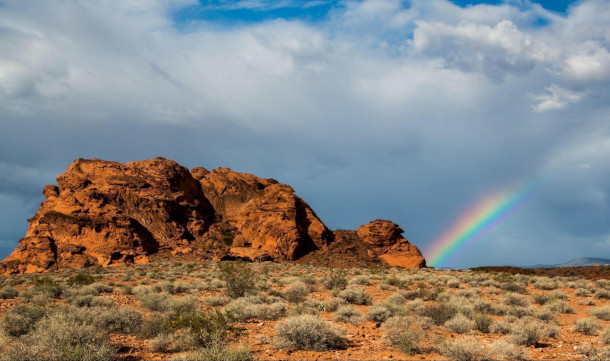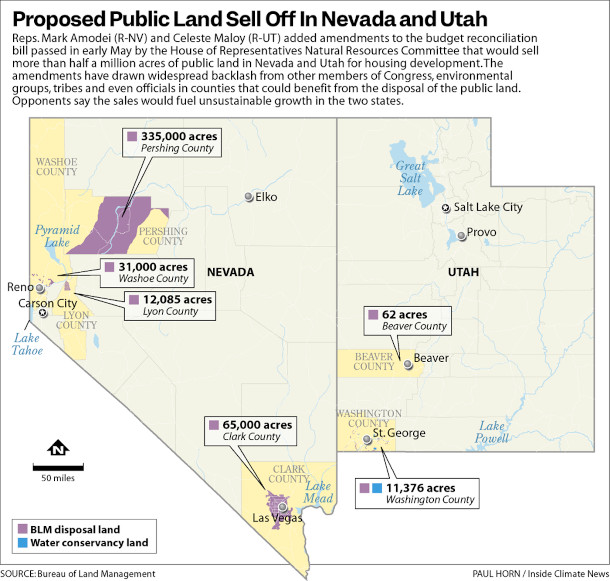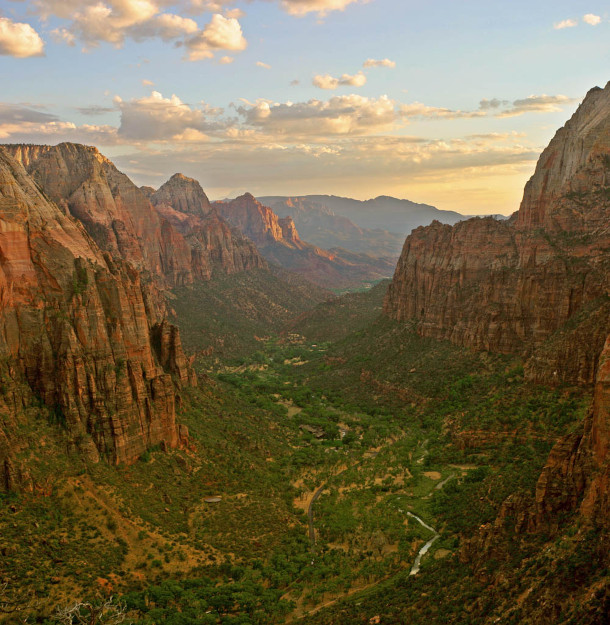Public Lands Reprieve
Air Date: Week of May 23, 2025

One of the proposed areas for development in Nevada was a swath of public land near the Gold Butte National Monument. (Photo: Bob Wick, BML, Flickr, CC BY 2.0)
Last-minute changes in the House budget reconciliation bill included scrapping one of the more controversial amendments that would have sold off public lands in the southwest to private developers. But the overall bill isn’t a complete win for the environment, with even deeper cuts to clean energy tax credits added at the last minute. Wyatt Myskow is the Mountain West Correspondent for Inside Climate News and joins Host Aynsley O’Neill to explain.
Transcript
DOERING: From PRX and the Jennifer and Ted Stanley Studios at the University of Massachusetts, Boston, this is Living on Earth. I’m Jenni Doering.
O’NEILL: And I’m Aynsley O’Neill.
With just a one vote majority, mostly along party lines, the House has passed what President Trump likes to call the “One Big, Beautiful Bill” to deliver on the bulk of his legislative agenda. Republicans are using what’s called budget reconciliation to allow the legislation to skip the Senate filibuster so it can pass with a simple majority in that chamber as well. At the last-minute GOP leaders made some key changes to the House bill, scrapping one of the more controversial amendments that would have sold off public lands in the southwest to private developers. Although the original provision came from Republican lawmakers, so did the push back against it, showing that care for our shared home can concern us all regardless of party affiliation. However, the overall bill isn’t a complete win for the environment, since another of those last-minute changes included some even deeper cuts to clean energy tax credits. Wyatt Myskow is the Mountain West Correspondent for our media partner Inside Climate News and he’s here to explain. Hey Wyatt, welcome back to the show!
MYSKOW: Thanks for having me.
O'NEILL: Well, so I've got to say these last minute changes have been a little tricky to keep track of. What's your reaction to the bill that the House has managed to pass?
MYSKOW: Well, it's notable that the amendment to sell off nearly half a million acres of public land in Nevada and southern Utah has been stripped from the bill. And I think there's a lot of climate things to talk about on this bill, but on the public lands front, it's a huge win for conservationists and recreationalists across the country. That amendment to the bill was deeply unpopular. It attracted a wide coalition from Nevada and Utah's other congressional members to local counties and towns to conservation groups, environmental groups, climate groups, all coming out in opposition. The amendment was stripped. Those lands will not be sold off, and it was led mainly by Congressman Ryan Zinke, which was quite notable. Listeners may remember his name. He was the former interior secretary under the first Trump administration. A man who many conservationists did not like that much has been a leading voice in fighting these public land sales. And he likened this fight, this amendment, to his San Juan Hill, referring to the battle in the Spanish American War, saying, after the bill had passed without this amendment, that once the land is sold, we will never get it back, and that God isn't creating more land. So this amendment really struck a chord with a variety of people across the country, and now it's gone.
O'NEILL: Well so half a million acres of public land across Utah and Nevada, that's a pretty massive swath. What would that have looked like? What was the controversy here, aside from just selling off public lands?

A graphic showing the original public land sell-off proposals from the budget reconciliation bill. These provisions were ultimately cut from the legislation before it passed. (Photo: Paul Horn, Inside Climate News)
MYSKOW: So those amendments proposed selling off those half a million acres for affordable housing in the two states, which is not necessarily controversial, but what made it so controversial is the nitty gritty of it. So there was nothing in the amendments to actually require that land to be sold exclusively for affordable housing, and some of that land would also go towards mining and other interests. One thing to really note, especially on the Nevada side of this, is that all the land identified to have been sold off had been proposed in already pre-existing bills proposed by other members of Nevada's congressional delegation. One, for example, the Southern Nevada Economic Development and Conservation Act would open up some public land near Las Vegas to expand the growth of the city, but it had a lot of aspects to it that made it more palatable to conservation groups. It had water conservation funds, money to go towards protecting other public lands. It would add wilderness designations to other areas in Nevada to further protect other areas. It did a variety of things that this amendments that were proposed in the budget reconciliation bill did not do, and that's what led it to be so controversial. And there was a big fear from tribes, from conservation groups, from other states, other members of Congress, like representative Zinke, that this would be a precursor to more public land sales across the country. That this was the test case, and if this could pass, then other lands would be put up for sale as well.
O'NEILL: And now to what extent do you think that the rather hasty way in which this public lands provision was added to the budget reconciliation bill sort of ultimately led to its downfall?
MYSKOW: The lack of public involvement in this amendment was a huge downfall for it. It was why so many groups and so many other members of Nevada's congressional delegation and across the US as well, came out against this and ultimately got it stripped, because it didn't involve the public. It didn't involve the stakeholders who would benefit from this. Even Clark County, the county that Vegas calls home, was not in support of this, even though they would have benefited from it.

An attempt to sell hundreds of thousands of acres of public land in Nevada and Utah was stopped before the House passed a spending bill on Thursday May 22, 2025. Pictured above is Zion National Park in Utah, which is nearby but would not have been affected by the provision. (Photo: Diliff, Wikimedia Commons, CC BY SA 3.0)
O'NEILL: Now let's talk briefly about the cuts to clean energy tax credits that were also in this House Bill. What has made it into the sort of final version that was passed?
MYSKOW: So under what the House passed, it eliminates electric vehicle tax credits after this year, for the most part, it would also eliminate tax credits for energy efficiency, rooftop solar, more energy efficient homes. And kind of a big deal here is that for clean electricity subsidies, they have to break ground within 60 days to receive any credits and go online by 2029. So it essentially means if you're building some form of clean energy project that qualified for those subsidies, you need to break ground as soon as this bill passes and is signed into law, and you need to be in operation by 2029. So if you can't do that, or if you do break ground somehow, but then maybe you get sued because you maybe had to rush things really quickly, and that lawsuit drags your construction into 2030, well, that's too bad you're out of any of those subsidies. The one exception is for nuclear. This is going to have real impacts on the ground across America, across states blue and red. Industry groups have said that this bill, the way it's currently ran, if it passes, would kill about 300,000 American jobs. It would increase electricity bills by 51 billion for American families and businesses, and ultimately, it means less energy is going to be built, which seems counterintuitive to President Trump's energy dominance plan.
O'NEILL: Well Wyatt, by the way, why was nuclear given an exception, do you think?
MYSKOW: Nuclear is kind of all the rage these days. It's not easy to build. There's still a lot of questions over how feasible this will be long term, just for financing projects. And there's so many questions of, where do you get the uranium needed to fuel nuclear, where you're going to store the waste, so many things. But the federal government, businesses, Wall Street and states and utilities have all really signaled over the past year, a renewed interest in expanding nuclear, and it's something that's fairly bipartisan right now, surprisingly, which has not necessarily been the case historically. And so, it's been able to weather some of these attacks on clean energy investments. Obviously, nuclear is more controversial than other types of clean energy, but nonetheless, there's a lot of interest in it.
O'NEILL: So now, as this heads to the Senate, how do you think that the energy and climate rollbacks might be received there, not just amongst Democrats, but amongst Republicans as well?

Wyatt Myskow is a reporter based in Phoenix, Arizona for Inside Climate News, where he covers water issues, development, public lands, wildfires and more. (Photo: Alex Gould)
MYSKOW: Well, the Senate, of course, is typically a bit more bipartisan. It's tough to say what exactly will change. Obviously, things are moving, and a lot is happening right now, and we still have days, if not weeks, before we finally know what's going to come out of this reconciliation bill. I would imagine many of this will tweak still. Funding under the Inflation Reduction Act, some of those clean energy tax credits and subsidies, I imagine the final numbers will look different than they do today. The public land front, things will probably look very similar. I'm doubtful anyone in the Senate is going to propose selling off public lands, but you never know. Really, it's all up in the air, but we can expect some form of this potentially to come.
O'NEILL: And we'll have to keep an eye on it. And Wyatt, is there anything else that struck you about this big, beautiful house bill?
MYSKOW: I would say the thing that really struck me on that public lands amendment that has been now been struck out of it, is that in this bill there are many provisions, amendments that are quite controversial. This one was as well, but those other provisions are still in the bill. The public lands, though, is not and I think that speaks to how beloved public lands are by Americans across the aisle. You know, you have hunters and fishers who are not necessarily the most left of leaning people who fought hard to get that provision stripped. So it really speaks to how on some issues, we still have quite a lot of common ground.
O'NEILL: Wyatt Myskow is the Mountain West Correspondent for our media partner Inside Climate News. Wyatt, as always, thank you for taking the time with me today.
MYSKOW: Of course, thanks so much for having me.
O’NEILL: It remains to be seen what will happen when the “One Big Beautiful Bill Act” reaches the Senate, but we’ll keep following developments and reporting in the next broadcasts.
Links
AP | “A Republican push to sell public lands in the West is reigniting a political fight”
Living on Earth wants to hear from you!
Living on Earth
62 Calef Highway, Suite 212
Lee, NH 03861
Telephone: 617-287-4121
E-mail: comments@loe.org
Newsletter [Click here]
Donate to Living on Earth!
Living on Earth is an independent media program and relies entirely on contributions from listeners and institutions supporting public service. Please donate now to preserve an independent environmental voice.
NewsletterLiving on Earth offers a weekly delivery of the show's rundown to your mailbox. Sign up for our newsletter today!
 Sailors For The Sea: Be the change you want to sea.
Sailors For The Sea: Be the change you want to sea.
 The Grantham Foundation for the Protection of the Environment: Committed to protecting and improving the health of the global environment.
The Grantham Foundation for the Protection of the Environment: Committed to protecting and improving the health of the global environment.
 Contribute to Living on Earth and receive, as our gift to you, an archival print of one of Mark Seth Lender's extraordinary wildlife photographs. Follow the link to see Mark's current collection of photographs.
Contribute to Living on Earth and receive, as our gift to you, an archival print of one of Mark Seth Lender's extraordinary wildlife photographs. Follow the link to see Mark's current collection of photographs.
 Buy a signed copy of Mark Seth Lender's book Smeagull the Seagull & support Living on Earth
Buy a signed copy of Mark Seth Lender's book Smeagull the Seagull & support Living on Earth

